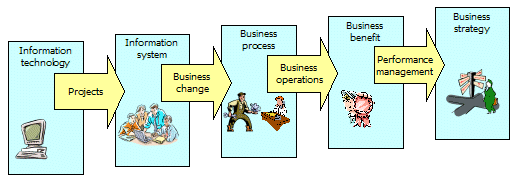The Framework | Knowledge areas | Processes | Limitations
Suppose that we know all about the five knowledge areas. We have experts who know all about the technologies that we use. We have competent systems development staff that can work reliably to deliver good systems that meet the specification of the requirements. Functional management in the main business areas is strong and the senior management team is well informed and sets reasonable targets. Things can still go wrong. The problem lies in the migration of ideas from one area of competency to another.

Information technology is useless until it is engineered into systems that meet the needs of the business. Getting business people to articulate their needs can be extremely difficult. Consider the case where a new customer relationship management system is to be developed, based on web technologies. Customer relationship management is not happening right now, at least not in any formalised sense. So, how can anyone tabulate and describe the facilities and functionality that might be needed? Project management is the information management process that delivers systems, and project management is still difficult. Project managers tend to focus on tasks, milestones, deliverables and budgets. It is a rare project manager that can see how all the detailed work in a project will produce the business benefits that represent the fulfilment of strategy.
The best information systems succeed in delivering benefits through the achievement of change. But people do not enjoy change, especially when it makes new demands upon their skills in the way that new information systems often do. Consider the case where a new sales system allows sales staff to deal with sales orders over the telephone, where previously they were solely concerned with mail and fax orders. The previous expectation was to deal with an order within a week (say), but now customers expect the order to be dealt with in minutes. Telephone skills that were previously needed only to deal with queries and complaints now need to be extended to deal with sales details, and with negotiation of terms and discounts. At the start that is not seen as a problem, but in the event it causes staff stress and they will resent this kind of change.
With new systems in place, with business processes improved, and with staff finally ready and able to work with new processes, then the business can get to work. By "business operations" here we mean the business at work, producing its goods and services, delivering value to customers and others, and performing to the expected level. We are now beyond the scope of direct involvement of information technology and information systems staff, but we are still very much concerned with the benefits of new information systems as seen through improved business performance. The way that systems have impacted on business operations has changed markedly over the years: from the early days, when all that was needed was a demonstrable improvement in throughput or a reduction in cost, we have progressed to the point where systems will sometimes dramatically change the way that we work. In some retailing businesses, supply-side companies (such as the food producers, or hardware suppliers) are now expected to manage the stock in the retail store directly, providing fresh stock when it is needed rather than waiting for the store management to place replenishment orders. The retailer may be asked to make a commitment to pay for supplied goods without an invoice, on the grounds that the price and the terms of payment are already agreed.
In the last few years there has been a dramatic rise of interest in the ways that we manage business performance. From the early days, when financial results were everything, we have moved to a much more sophisticated regime where we strive to balance financial success with internal efficiency, with customer satisfaction, and with organisational learning and development. It is no longer sufficient just to make money, we have to make the customer happy, work to improve internal operations so as to be "best of breed", and we have to ensure that all the time the organisation is moving forward in terms of capability and competencies. Performance management is where business strategy meets business operations, and where the benefits of our investment in better business practice are finally seen and delivered.